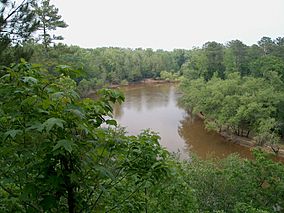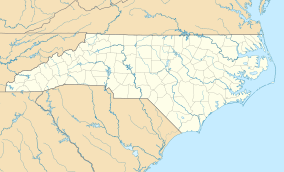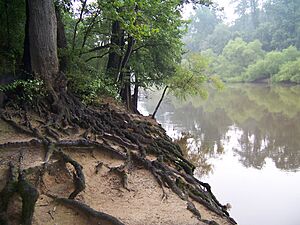Cliffs of the Neuse State Park facts for kids
Quick facts for kids Cliffs of the Neuse State Park |
|
|---|---|
|
IUCN Category III (Natural Monument)
|
|

The Neuse River seen from the cliffs above
|
|
| Location | Wayne County, North Carolina, United States |
| Area | 1,097 acres (4.44 km2) |
| Established | 1945 |
| Named for | The cliffs along the Neuse River |
| Governing body | North Carolina Division of Parks and Recreation |
| Website | Cliffs of the Neuse State Park [1] |
Cliffs of the Neuse State Park is a cool place to visit in North Carolina. It's a state park located near Seven Springs, North Carolina, in Wayne County. The park covers about 1,097 acres (4.4 square kilometers) along the southern side of the Neuse River.
This park is a great spot for outdoor fun! You can go swimming, camping, hiking, fishing, and have picnics. The park even has a museum. It teaches you about the amazing geology and nature of the cliffs and the area. The main attraction is a series of cliffs that stretch for about 600 yards (550 meters). These cliffs rise about 90 feet (27 meters) above the river. They are made of different layers of sand, clay, seashells, shale, and gravel. This mix creates a beautiful rainbow of white, tan, yellow, and brown colors on the cliff face.
Contents
Discover Cliffs of the Neuse State Park
How the Cliffs Were Formed
The incredible cliffs you see today were created millions of years ago. This happened when a crack in the Earth's crust, called a fault, moved. The Neuse River started flowing along this fault line. Over a very long time, the river slowly cut its way through layers of dirt and rock. These layers were left behind by shallow seas that once covered the coastal plain. A part of the river then curved against its bank. The constant flow of water slowly wore away the land, carving out the Cliffs of the Neuse.
A Look Back in Time: History of the Park
Early Inhabitants and the River
The history of this area is closely tied to the river. Long ago, the Tuscarora and Saponi Native American tribes lived in much of the land around the Neuse and Pamlico rivers. The area that is now the park was a special place for ceremonies. It was also a gathering spot for hunting trips. The river itself was like a highway, used for traveling deep into the wild lands.
Creating the State Park
In 1944, a local landowner named Lionel Weil had a great idea. He suggested that the beautiful cliffs along the Neuse River should be protected as a state park. The park officially opened in 1945. This happened because Lionel Weil and others, through the Wayne Foundation, donated land on the south side of the river. Later, about 200 more acres (0.8 square kilometers) were added to the east of the river. More land was bought and donated over time. This helped the park grow to its current size of about 892 acres (3.6 square kilometers).
Amazing Animals and Plants
Plants of the Park
The park has many different types of environments, called habitats. These habitats help a wide variety of plants grow here. You can find plants along the riverbanks, in flood plains, on rolling hills, and in deep ravines. This mix of places means there are many kinds of trees, bushes, and smaller plants. More than 420 different plant species have been found in the park!
Wildlife You Might See
You might spot many animals in the park. Opossums, raccoons, foxes, and squirrels are often seen near the campgrounds and on hiking trails. If you watch the waterways, you might see river otters and muskrats swimming. Reptiles and amphibians also love the wet and water-filled areas. Most of the snakes you might see are not venomous. However, copperheads do live here, so it's always good to be careful. Small animals that are active at night and white-tailed deer also live in the area. They are usually shy and hard to spot. Sometimes, people have even seen black bears and coyotes in the park!
Birds in the Park
Birds are everywhere in the park, no matter the season. The northern parula bird builds its nest in clumps of Spanish moss. The prothonotary warbler likes to live along the river. In the fall and winter, many different kinds of water birds fly to the area. They join the wood ducks that live there all year round.




